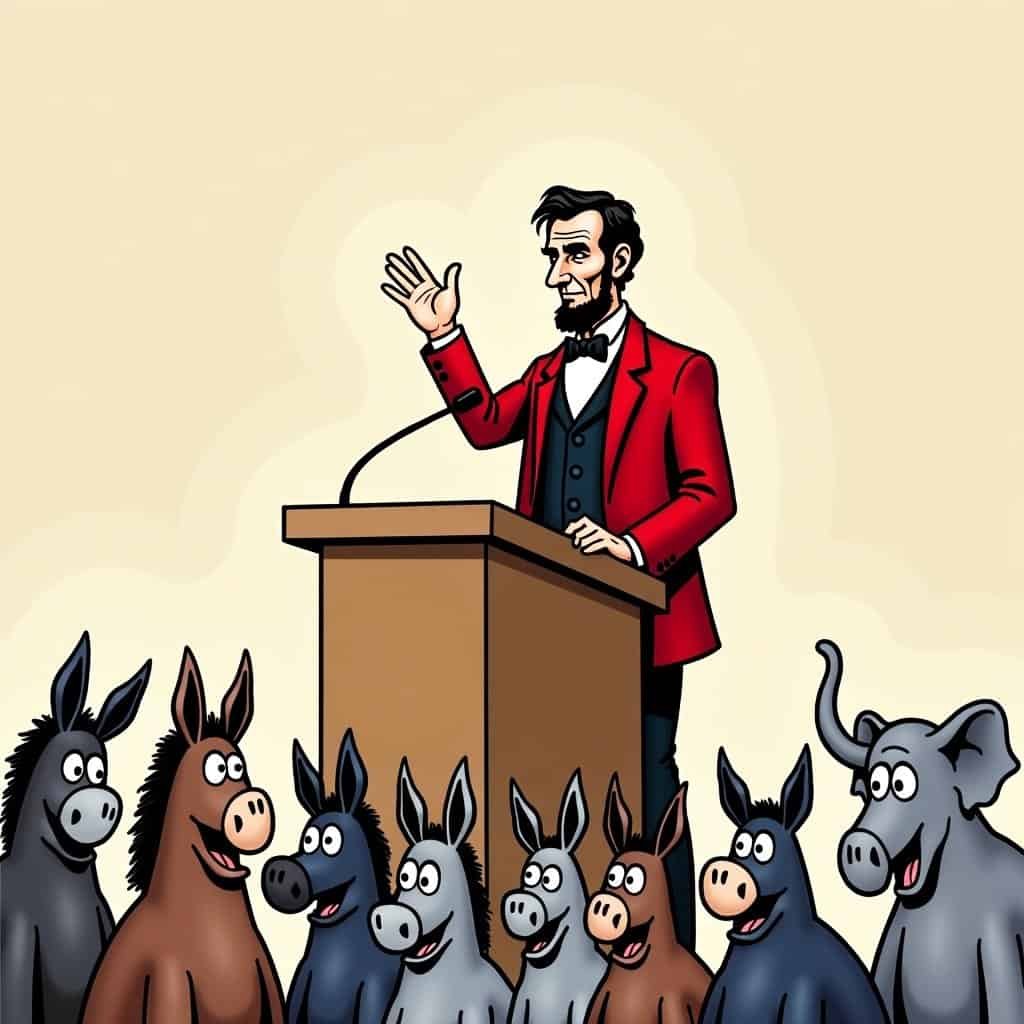Ah, the good old days of Abraham Lincoln, a name so revered it sends chills down the spine of a donkey! Picture it—the Northern states, bustling with newfound energy, industries rising like wet bread dough, all thanks to the vision of a man donning a top hat that could double as a stovepipe. It’s like how a great Republican bake-off would be—stirring the economic pot until you have the aroma of job creation wafting through the homes of hardworking citizens.
While the Democrats were busy discussing how to divide the proverbial pie into equal crumbs—an industry in negative growth—Republicans under Lincoln focused on the pie factory itself, ensuring everyone was a buyer, a seller, a flour-snorter, if you will. Lincoln didn’t just see a united nation; he saw a nation buzzing with productivity and had no time for the idle chitchat that yielded no payoff.
Lincoln’s approach to economic policy would make any free-market enthusiast grin from ear to ear. Conservatives would find it hilarious that there was no need for the Feds to meddle in economic matters. His strategy? As straightforward as apple pie! Let innovation and entrepreneurship take center stage. Why bother fixing something Democrats claim is broken when you can just grease the wheels and fire up the engine?
Lincoln’s Economic Policies: A Recipe for Success
| Policy | Impact |
|---|---|
| Reduced barriers to industry expansion | Boosted economic growth |
| Lower taxes | Increased disposable income |
| Limited government intervention | Encouraged private sector growth |
| Support for innovation | Sparked technological advancements |
This was a time before endless government programs graced us with their presence, long before the swamp of nervous hand-holding took over what should be the natural flow of capitalism. He slashed barriers to industry expansion, reduced taxes where he could, put Uncle Sam on a diet—something even Jenny Craig would find magical—and voila, the Union states witnessed a surge in job opportunities.
Unlike those who think the government can control every aspect of the economy—like a conductor who’s lost touch with their orchestra—Lincoln valued the private sector’s mojo. It was business-minded individuals who, armed with their ideas and ambitions, steered America’s economic ship toward prosperity. And just like that, Northern job creation became an unstoppable force, a railroad of riches if you wish.
Job Creation for All: Lincoln’s Economic Legacy
The beauty of this job creation was plain as daylight—it was not limited to the educated elite or the rich alone. It came with opportunities for every able body willing to contribute to the tapestry of economic triumph the Northern states were weaving. Here was a man whose legacy taught us one major thing: instead of providing fish, teach communities to fish, then perhaps even to open their own canned fish factories.
In today’s ongoing debate between conservatives and progressives, one can still hear the echoes of Lincoln’s vision. The conservatives praise the benefits of trimming the government’s waistline, emphasizing that people flourish when given the tools, but not the cradle. Jobs are created not by taxing into oblivion and spendthrift welfare but through investing in endeavors inherently valuable and rewarding.
Next time you hear a tune about government expansion or wealth redistribution at a party, remember Lincoln’s way—outward golden fields of job creation, where prosperity is personal responsibility wrapped in entrepreneurial spirit, topped with a sprinkle of non-nosy government.
Lincoln’s Legacy: A Conservative Masterclass
If Lincoln could glance down on us now (all 6-foot-4 of him), he might be stroking his beard in appreciation. His blueprint thrived on robust Republican values, empowering the Northern workforce to be the inventors of their destiny. So let’s rise up, with heads held high, and marvel at the practical genius of Lincoln’s Northern job masterclass.
Because at the end of the day, the true essence of Lincoln’s job creation genius boils down to conservative prosperity: Lower taxes, less regulation, and more freedom to innovate. You can almost hear Lincoln bellowing a hearty chuckle echoing through time at the thought of today’s policies, ‘What will they think of next?’
Table of Contents
- Lincoln’s Economic Policies: A Recipe for Success
- Job Creation for All: Lincoln’s Economic Legacy
- Lincoln’s Legacy: A Conservative Masterclass






